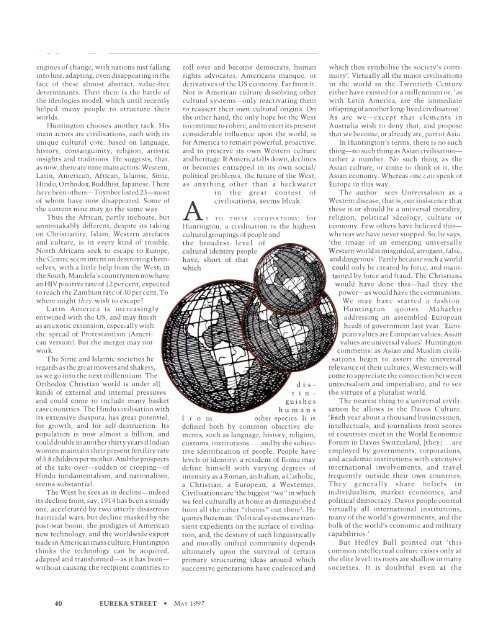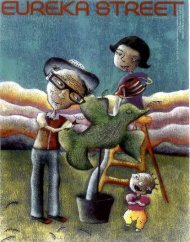n - Eureka Street
n - Eureka Street
n - Eureka Street
Create successful ePaper yourself
Turn your PDF publications into a flip-book with our unique Google optimized e-Paper software.
engines of change, with nations just fallinginto line, adapting, even disappearing in theface of these almost abstract, value-freedeterminants. Then there is the battle ofthe ideologies model, which until recentlyh elped many people to structure theirworlds.Huntington chooses another tack. Hismain actors are civilisation s, each with itsunique cultural core, based on language,history, consanguinity, religion, artisticinsights and traditions. He suggests, that,as now, there are nine main actors: Western,Latin, American, African, Islamic, Sinic,Hindu, Orthodox, Buddhist, Japanese. Therehave been others-Toynbee listed 23-mostof whom have now disappeared. Some ofthe current nine may go the same way.Thus the African, partly inchoate, butunmistakably different, despite its takingon Christianity, Islam, Western artefactsand culture, is in every kind of trouble.North Africans seek to escape to Europe,the Centre seem intent on destroying themselves,with a little help from the West; inthe South, Mandela's countrymen now havean HIV positive rate of 12 per cent, expectedto reach the Zambian rate of 30 per cent. Towhere might they wish to escape?Latin America is increasinglyentwined with the US, and may finishas an exotic extension, especially withthe spread of Protestantism (Americanversion ). But the merger may notwork.The Sinic and Islamic societies heregards as the great m overs and shakers,as we go into the next millennium. TheOrthodox Christian world is under allkinds of external and internal pressuresand could come to include many basketcase countries. Th e Hindu civilisation withits exten sive diaspora, has grea t potential,fo r growth, and for self-destruction. Itspopulation is now almost a billion, andcould double in another thirty years if Indianwomen maintain their present fertility rateof 3. 8 children per mother. And the prospectsof the take-over-sudden or creeping-ofHindu fundam entalism, and nationalism,seem s substantial.The West he sees as in decline- indeedits decline from, say, 1914 has been a steadyone, accelerated by two utterly disastrousfratricidal wars; but decline masked by thepost-war boom, the prodigies of Americannew technology, and the worldwide exporttrade in American mass culture. Huntingtonthinks the technology can be acquired,adapted and transformed-as it has beenwithoutcausing the recipient countries toroll over and become democrats, humanrights advocates, Americans manque, orderivatives of the US econom y. Far from it.Nor is American culture dissolving othercultural systems- only reactivating themto reassert their own cultural origins. Onthe other hand, the only hope for the Westto continue to cohere, and to exert its presentconsiderable influence upon the world, isfor America to remain powerful, proactive,and to preserve its own Western cultureand heritage. If America falls down, declinesor becom es entrapped in its own social/political problems, the future of the West,as anything other than a backwaterin the great contest ofcivilisations, seem s bleak.TO THESE CIVIL ISATIONS : forHuntington, a civilisation is the highestcultural groupings of people andthe broadest level ofcultural identity peopleh ave, short of thatwhichd i s -t i n -guisheshum a n sf r o mother species. It isdefined both by common objective elements, such as language, history, religion,customs, institutions ... and by the subjectiveidentification of people. People havelevels of identity: a resident of Rome maydefine himself with varying degrees ofintensity as a Roman, an Italian, a Catholic,a Christian, a European, a Wes terner.Civilisations are 'the biggest "we" in whichwe feel culturally at home as distinguishedfro m all the other "thems" out there'. Hequotes Bozeman: 'Political systems are transientexpedients on the surface of civilisation,and, the destiny of each linguisticallyand morally unified community dependsultimately upon the survival of certainprimary structuring ideas around whichsuccessive generations have coalesced andwhich thus symbolise the society's continuity'.Virtually all the major civilisationsin the world in the Twentieth Centuryei ther have existed for a millennium or, 'aswith Latin America, are the immediateoffspring of another long-lived civilisation'.As are we- except that elem ents inAustralia wish to deny that, and proposethat we become, or already are, part of Asia.In Huntington's terms, there is no suchthing- no such thing as Asian civilisationrathera number. No such thing as theAsian culture, or come to think of it, theAsian econom y. Whereas one can speak ofEurope in this way.Th e author sees Universalism as aWestern disease, that is, our insistence thatthese is or should be a universal m orality,religion, political ideology, culture oreconomy. Few others have believed thiswhereaswe have never stopped. So, he says,'th e image of an emerging universallyWestern world is misguided, arrogant, false,and dangerous'. Partly because such a worldcould only be created by force, and maintainedby force and fraud. The Christianswould have done this-had they thepower-as would have the communists.We may have st arted a fash ion.Huntington quotes Mahathiraddressing an assembled Europeanh eads of government last year. 'Europeanvalues are European values; Asianvalues are universal values'. Huntingtoncomments: as Asian and Muslim civilisationsbegin to assert the universalrelevance of their cultures, Westerners willcome to appreciate the connection betweenuniversalism and imperialism, and to seethe virtues of a pluralist world.The n earest thing to a universal civilisationh e allows is the Davos Culture.'Each year about a thousand businessm en,intellectuals, and journalists from scoresof countries m eet in the World EconomicForum in Davos Switzerland, [they] ... areemployed by governments, corporations,and academic institutions with extensiveinternational involvements, and travelfrequently outside their own countries.They generally share beliefs inindividualism, market economics, andpolitical democracy. Davos people controlvirtually all interna tiona! institutions,m any of the world's governments, and thebulk of the world's economic and militarycapabilities.'But Hedley Bull pointed ou t ' thiscommon intellectual culture exists only atthe elite level: its roots are shallow in manysocieties. It is doubtful even at the40 EUREKA STREET • M AY 1997
















